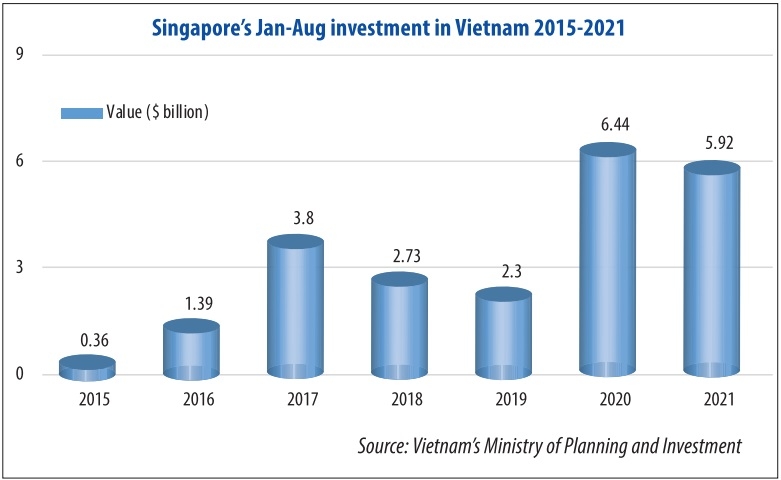Singaporean investors grasp the available opportunities
 |
| Vietnam is having to modernise across all fields in order to entice the brightest and best. Photo: Shutterstock |
In late June, the Mekong Delta province of Bac Lieu announced that Singapore’s Delta Offshore Energy Pte. Ltd. – the investor of the $4-billion liquefied natural gas (LNG) power plant – has established Bac Lieu Gas Power Co., Ltd., which plans to complete its facility in 2027.
The new move adds to the general interest in energy, infrastructure, industrial parks, and high technology among Singaporean investors in Vietnam in 2021 despite the global restrictions. A number of virtual meetings and webinars have also been held so far this year to enable Singaporeans to learn more about Vietnam’s growth prospects.
In early July, a webinar on the growth prospects and opportunities of Vietnam in 2021 were held, following the webinar on Vietnam-Singapore economic cooperation and the future development of Danang in May which lured nearly 300 Singaporean businesses and investors. A month earlier, at an event on connecting industrial investment between Singaporean businesses and Vietnamese provinces was co-organised by the Ministry of Industry and Trade and southern provinces, at which several Singaporean enterprises asserted that they are targeting many infrastructure and processing projects in Vietnam.
Not many countries have such a high frequency of events like Singapore to facilitate its business and seek opportunities in Vietnam. According to the Singapore Business Federation, most outbound investment plans target Vietnam.
According to statistics from the Ministry of Planning and Investment (MPI), Singaporean businesses invested a total of nearly $9 billion in Vietnam in 2020, or 31.5 per cent of the country’s total foreign direct investment, making it the largest overseas investor.
The growth momentum continues in 2021. In the first seven months of the year, Singapore still took the lead among Vietnam’s foreign investors with $5.92 billion. Most Singaporean capital is newly registered, accounting for 81 per cent of its total capital.
This is attributed to the close economic ties between the two countries. Moreover, bi-and multilateral agreements are creating favourable conditions for businesses of both markets.
Vietnamese Deputy Minister of Planning and Investment Nguyen Bich Ngoc said that groups tend to restructure their production and reposition investment, and Vietnam also has adjustments its investment strategy to suit this, which has been a driving force for Singaporeans.
 |
Key advances
According to Vietnamese Ambassador to Singapore Le Cong Dung, the signing of the Singapore-Vietnam Connectivity Framework (CFA) in 2006 is a motivation for the bilateral ties, with the bilateral trade doubling to $22.7 billion in 2020.
The agreement has not only created more favourable conditions for dialogue between the two governments, but also for between businesses and governments. The CFA focuses on six pillars of education and training, finance, IT, transportation, investment and trade, and services.
He added that recent amendments in the newly-effective laws on investment, enterprises, and public-private partnerships are the most important changes related to businesses, making the business climate more transparent, competitive, favourable, and eligible for international norms and practices.
In recent years, Singaporean investors have diversified their participation across Vietnam via various means. Infrastructure solutions for urban development are among the typical sectors in the bilateral ties. Since the first Vietnam-Singapore Industrial Park (VSIP) was established 25 years ago in the southern province of Binh Duong, many more VSIPs have been established up and down Vietnam.
In real estate, new moves have been seen despite COVID-19, with Pegasus Investment and Consultancy JSC – an education institution from Singapore – and Banyan Tree Hotels & Resorts in April signing a hotel management agreement to operate Dhawa Quy Nhon Vietnam. Other outstanding names include CapitaLand and Mapletree.
Energy is another strong expertise of Singapore. In March, the $3.1-billion LNG Long An I and II gas power project invested by VinaCapital GS Energy Pte Ltd of Singapore received their investment certificates.
In 2019, clean energy provider Sunseap developed a $150-million utility-scale solar farm in the south-central province of Ninh Thuan.
Nevertheless, manufacturing remains the most attractive sector among foreign investors in Vietnam. This is driven by the shifting of manufacturing bases to Vietnam and the Industry 4.0 solutions that are applied as a part of the diversification of supply chains among multinationals.
Singaporeans are also looking for opportunities to benefit from Vietnam’s supporting policies and growing demands in urban solutions and smart cities, as well as innovation and startups. There are now at least 50 Singaporean startups with a presence in Vietnam.
Singaporean investors are also venturing further into e-commerce, edtech, fintech, and medtech to tap into these growing trends, driven by the acceleration of digital transformation.
Fresh opportunities
Do Nhat Hoang, general director of the MPI’s Foreign Investment Agency (FIA), said that to welcome a new wave of investments, Vietnam is examining its land funds at industrial parks, focusing on human resource training, and increasing global integration with the signing of many free trade agreements and the improvement of the business climate and legal framework.
Hoang elaborated that Vietnam’s policy and regulations on foreign investment become more favourable, especially for large projects, using high-tech in alignment with the country’s economic development strategy. There are some specific incentives for potential investors, including the application of a 5-per-cent preferential rate for corporate income tax and the reduction and exemption of land leasing fees for qualified investors.
The FIA leader recommended that that foreign investors in Vietnam should study and seek out opportunities that include processing and manufacturing, high-quality services, and also logistics because they have huge growth potential.
“For investors who have expertise in fintech and innovation, the focus should be urban areas with developed infrastructure, like Hanoi and Ho Chi Minh City,” Hoang added. “Moreover, Vietnam is developing financial centres with the aim to integrate further into regional financial networks.”
At the meeting with Minister for Foreign Affairs of Singapore Vivian Balakrishnan in June, State President Nguyen Xuan Phuc asked to extend the cooperation in digital economy, digital transformation, e-commerce, smart cities, and other areas, while benefiting from the advantages of the many free trade agreements that both are parties to.
The recent moves from the two governments are ultimately expediting the establishment of joint working groups to develop bilateral agreements on digital economy and mutual recognition of health certificates.
What the stars mean:
★ Poor ★ ★ Promising ★★★ Good ★★★★ Very good ★★★★★ Exceptional
Related Contents
Latest News
More News
- Vietnam financial markets on the rise amid tailwinds (February 11, 2026 | 11:41)
- New tax incentives to benefit startups and SMEs (February 09, 2026 | 17:27)
- VIFC launches aviation finance hub to tap regional market growth (February 06, 2026 | 13:27)
- Vietnam records solid FDI performance in January (February 05, 2026 | 17:11)
- Manufacturing growth remains solid in early 2026 (February 02, 2026 | 15:28)
- EU and Vietnam elevate relations to a comprehensive strategic partnership (January 29, 2026 | 15:22)
- Vietnam to lead trade growth in ASEAN (January 29, 2026 | 15:08)
- Japanese business outlook in Vietnam turns more optimistic (January 28, 2026 | 09:54)
- Foreign leaders extend congratulations to Party General Secretary To Lam (January 25, 2026 | 10:01)
- 14th National Party Congress wraps up with success (January 25, 2026 | 09:49)

 Tag:
Tag:




















 Mobile Version
Mobile Version